英语高分笔记
高一英语老师笔记摘抄(3篇)

第一部分:词汇学习一、基础词汇1. adj. [adj. / ˈdɪspəʊzəbl /] 可处置的;可处理的- 例句:The company has a large number of disposable income.- 例句:It's important to find a disposal method for the waste. 2. n. [n. / ˈdɪspəʊzəl /] 处理;处置- 例句:The disposal of the waste is a major environmental issue.- 例句:We need to find a proper disposal method for the old computers.3. v. [v. / dɪˈspəʊz /] 处理;处置- 例句:The government is working to dispose of the surplus food. - 例句:He disposed of his old car for a good price.二、重点短语1. dispose of 处理;处置- 例句:We need to dispose of the waste in a proper way.- 例句:The company has disposed of the unused inventory.2. dispose to/for 倾向于;想要- 例句:He is disposed to help others in need.- 例句:She is disposed for a new job.3. dispose oneself to 准备好;愿意- 例句:He disposed himself to the new job with enthusiasm.- 例句:She disposed herself to learn a new language.第二部分:语法学习1. 现在进行时(Present Continuous Tense)- 构成:主语 + am/is/are + 现在分词(动词ing形式)- 例句:I am reading a book right now.- 例句:They are watching a movie.2. 过去进行时(Past Continuous Tense)- 构成:主语 + was/were + 现在分词- 例句:I was walking to school when it started to rain.- 例句:They were playing football when the bell rang.3. 将来进行时(Future Continuous Tense)- 构成:主语 + will/shall be + 现在分词- 例句:I will be studying for the exam tomorrow.- 例句:They will be traveling to Paris next month.二、虚拟语气1. 与现在事实相反的虚拟语气- 构成:If + 主语 + were, 主语 + would/could/might/should + 动词原形- 例句:If I were you, I would study harder.- 例句:If he were here, he would help us.2. 与过去事实相反的虚拟语气- 构成:If + 主语 + had, 主语 + would/could/might/should + have + 过去分词- 例句:If I had known, I would have helped you.- 例句:If she had studied harder, she would have passed the exam.3. 与将来事实相反的虚拟语气- 构成:If + 主语 + were to, 主语 + would/could/might/should + 动词原形- 例句:If I were to win the lottery, I would travel the world.- 例句:If it were to rain tomorrow, we would cancel the trip.第三部分:阅读理解一、阅读技巧1. 快速浏览:了解文章大意,把握主题。
高中英语学霸笔记
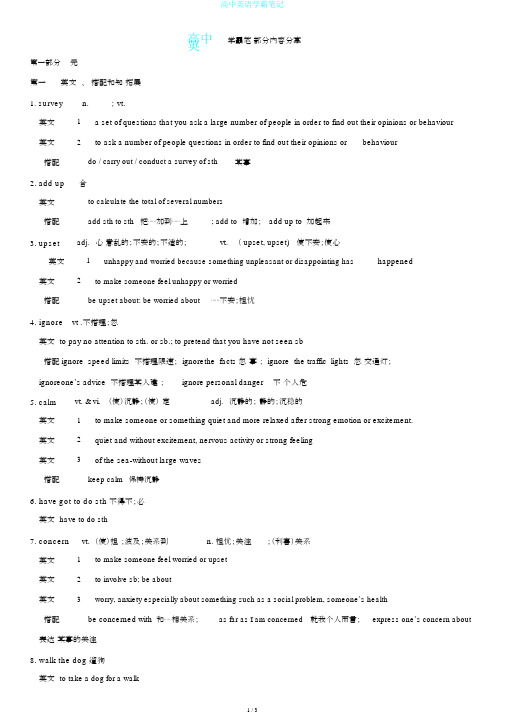
高中英学霸笔部分内容分享第一部分元第一英文、搭配和知拓展1. survey n.;vt.英文1 a set of questions that you ask a large number of people in order to find out their opinions or behaviour 英文2to ask a number of people questions in order to find out their opinions or behaviour搭配do / carry out / conduct a survey of sth某事2. add up合英文to calculate the total of several numbers搭配add sth to sth把⋯⋯加到⋯⋯上; add to增加;add up to加起来3. upset adj.心意乱的;不安的;不适的;vt.( upset, upset)使不安;使心英文1unhappy and worried because something unpleasant or disappointing has happened 英文2to make someone feel unhappy or worried搭配be upset about: be worried about⋯⋯不安;担忧4.ignore vt .不搭理;忽英文to pay no attention to sth. or sb.; to pretend that you have not seen sb搭配ignore speed limits 不搭理限速; ignorethe facts 忽事; ignore the traffic lights 忽交通灯;ignoreone`s advice 不搭理某人建;ignore personal danger不个人危5. calm vt. & vi.(使)沉静;(使)定adj.沉静的;静的;沉稳的英文1to make someone or something quiet and more relaxed after strong emotion or excitement.英文2quiet and without excitement, nervous activity or strong feeling英文3of the sea-without large waves搭配keep calm保持沉静6.have got to do sth不得不;必英文have to do sth7. concern vt. (使)担;波及;关系到n. 担忧;关注;(利害)关系英文1to make someone feel worried or upset英文2to involve sb; be about英文3worry, anxiety especially about something such as a social problem, someone`s health搭配be concerned with和⋯⋯相关系;as far as I am concerned就我个人而言;express one`s concern about 表达某事的关注8.walk the dog 遛狗英文to take a dog for a walk.......第二节构词变化1.ignore vt.; 不搭理;忽略; ignorant adj . 无知的 ; 不学无术的 ; ignorance n. 无知;愚笨2. concern vt.(使)担忧;波及;关系到; concerning prep 对于adv.在户外,在野外;outdoor adj.户外的;野外的;indoors adv.在室内; indoor adj.室内的......第二部分课文要点短语、句型和长难句分析第一节课文要点短语1. be good to sb =be friendly to sb=be kind to sb对某人友善( P1)知识拓展be good for sb对某人有利处be bad for sb对某人有缺点2. do the following survey做下边的检查(P1)知识拓展do a survey of population growth检查人口增加(P1)3.add up your score 加起来你的分数(P1)知识拓展add up the bills 把账单加起来; add to the trouble 增加了麻烦; add to much fun 增加了乐趣 ; add the name to the list 给名单上添个名字; add some wood to the fire 給火堆里添柴 ;add some salt to the pot 给锅里放盐( P1) 4.another time 下次; another day改天(P1)第二节句型及长难句简单分析1. You want to see a very interesting film with your friend, but your friend can`t go until he finishes cleaning his bicycle.(本句为 but 指引的并列句。
高考英语知识点笔记整理
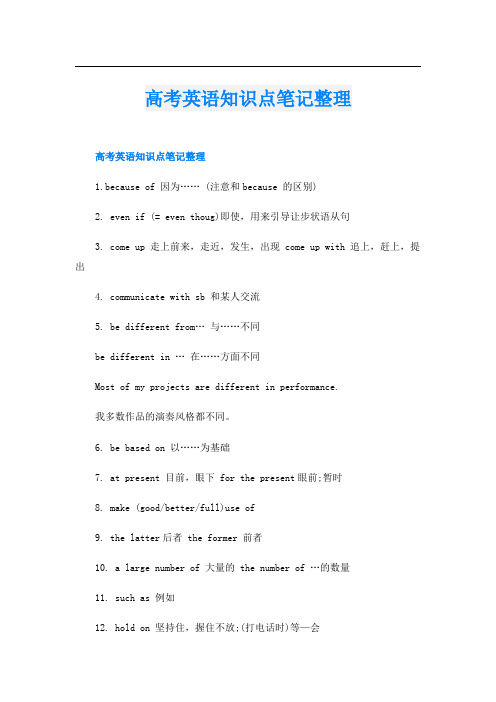
高考英语知识点笔记整理高考英语知识点笔记整理1.because of 因为…… (注意和because 的区别)2. even if (= even thoug)即使,用来引导让步状语从句3. come up 走上前来,走近,发生,出现 come up with 追上,赶上,提出4. communicate with sb 和某人交流5. be different from…与……不同be different in …在……方面不同Most of my projects are different in performance.我多数作品的演奏风格都不同。
6. be based on 以……为基础7. at present 目前,眼下 for the present眼前;暂时8. make (good/better/full)use of9. the latter后者 the former 前者10. a large number of 大量的 the number of …的数量11. such as 例如12. hold on 坚持住,握住不放;(打电话时)等—会13. … you will hear the difference in the way(that/ in which) people speak.你会听出人们在说话时的差异。
14. play a role/ part (in) 在…中担任角色;在…中起作用;扮演一个角色15. the same …as…与……一样16. at the top of…在…顶上at the bottom of 在……底部17. bring up 教养,养育;提出18. request sb (not) to do sth. 要求某人做/不要做某事19. be satisfied with…对……感到满意,满足于20. suggest v. (request,insist…)I suggested you do what he says. 我建议你按照他说的去做。
高英(高级英语)复习笔记及讲解5
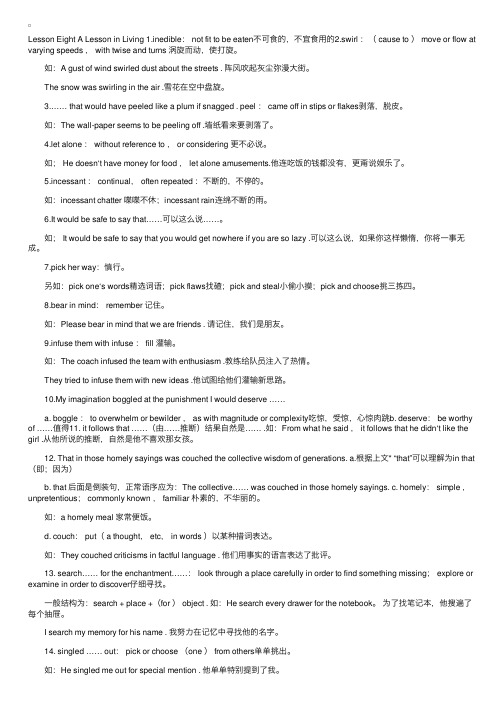
Lesson Eight A Lesson in Living 1.inedible: not fit to be eaten不可⾷的,不宜⾷⽤的2.swirl :( cause to ) move or flow at varying speeds , with twise and turns 涡旋⽽动,使打旋。
如:A gust of wind swirled dust about the streets . 阵风吹起灰尘弥漫⼤街。
The snow was swirling in the air .雪花在空中盘旋。
3.…… that would have peeled like a plum if snagged . peel : came off in stips or flakes剥落,脱⽪。
如:The wall-paper seems to be peeling off .墙纸看来要剥落了。
4.let alone : without reference to , or considering 更不必说。
如; He doesn‘t have money for food , let alone amusements.他连吃饭的钱都没有,更甭说娱乐了。
5.incessant : continual, often repeated :不断的,不停的。
如:incessant chatter 喋喋不休;incessant rain连绵不断的⾬。
6.It would be safe to say that……可以这么说……。
如; It would be safe to say that you would get nowhere if you are so lazy .可以这么说,如果你这样懒惰,你将⼀事⽆成。
7.pick her way:慎⾏。
另如:pick one‘s words精选词语;pick flaws找碴;pick and steal⼩偷⼩摸;pick and choose挑三拣四。
大学生英语笔记摘抄(3篇)
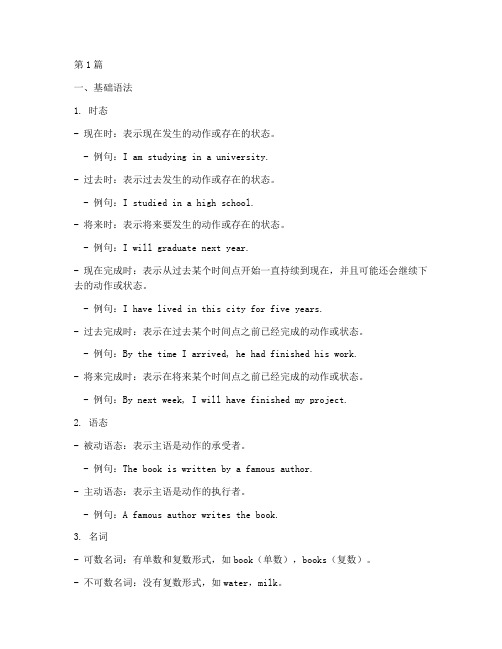
第1篇一、基础语法1. 时态- 现在时:表示现在发生的动作或存在的状态。
- 例句:I am studying in a university.- 过去时:表示过去发生的动作或存在的状态。
- 例句:I studied in a high school.- 将来时:表示将来要发生的动作或存在的状态。
- 例句:I will graduate next year.- 现在完成时:表示从过去某个时间点开始一直持续到现在,并且可能还会继续下去的动作或状态。
- 例句:I have lived in this city for five years.- 过去完成时:表示在过去某个时间点之前已经完成的动作或状态。
- 例句:By the time I arrived, he had finished his work.- 将来完成时:表示在将来某个时间点之前已经完成的动作或状态。
- 例句:By next week, I will have finished my project.2. 语态- 被动语态:表示主语是动作的承受者。
- 例句:The book is written by a famous author.- 主动语态:表示主语是动作的执行者。
- 例句:A famous author writes the book.3. 名词- 可数名词:有单数和复数形式,如book(单数),books(复数)。
- 不可数名词:没有复数形式,如water,milk。
- 名词所有格:表示所属关系,如the teacher's book,my friend's car。
4. 代词- 人称代词:I(我),you(你),he(他),she(她),it(它),we(我们),they(他们)。
- 物主代词:my(我的),your(你的),his(他的),her(她的),its(它的),our(我们的),their(他们的)。
高级英语笔记整理
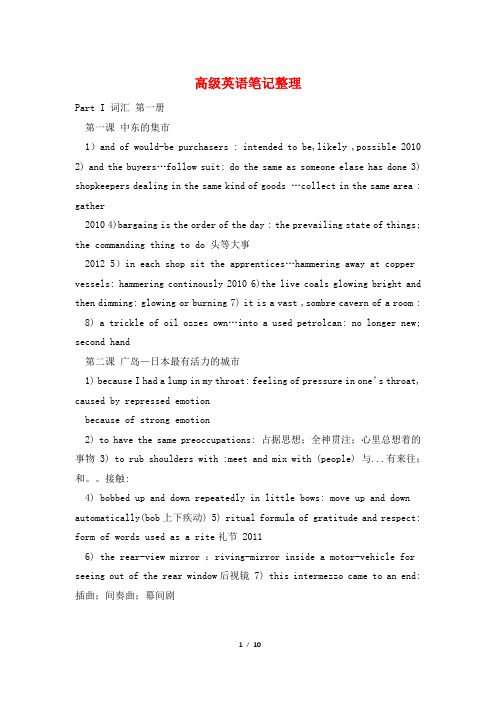
高级英语笔记整理Part I 词汇第一册第一课中东的集市1)and of would-be purchasers : intended to be,likely ,possible 2010 2) and the buyers…follow suit: do the same as someone elase has done 3) shopkeepers dealing in the same kind of goods …collect in the same area : gather2010 4)bargaing is the order of the day : the prevailing state of things; the commanding thing to do 头等大事2012 5)in each shop sit the apprentices…hammering away at copper vessels: hammering continously 2010 6)the live coals glowing bright and then dimming: glowing or burning 7) it is a vast ,sombre cavern of a room : 8) a trickle of oil ozzes own…into a used petrolcan: no longer new; second hand第二课广岛—日本最有活力的城市1) because I had a lump in my throat: feeling of pressure in one’s throat, caused by repressed emotionbecause of strong emotion2) to have the same preoccupations: 占据思想;全神贯注;心里总想着的事物 3) to rub shoulders with :meet and mix with (people) 与...有来往;和。
五下学霸笔记摘抄英语(3篇)
第1篇第一章:词汇积累1. 基础词汇- ability:能力,才能- achieve:完成,实现- activity:活动,行动- advice:建议,忠告- appearance:外观,外表- benefit:好处,利益- challenge:挑战,考验- change:改变,变革- communication:交流,沟通 - community:社区,团体- culture:文化,文明2. 进阶词汇- environment:环境,周围情况 - exciting:令人兴奋的- influence:影响,作用- interesting:有趣的- knowledge:知识,学问- opportunity:机会,机遇- problem:问题,困难- satisfaction:满意,满足- solution:解决办法,方案- technology:技术,工艺第二章:语法要点1. 一般现在时- 主语 + 动词原形- 例句:I like reading books.(我喜欢读书。
)2. 一般过去时- 主语 + 动词过去式- 例句:I watched a movie yesterday.(我昨天看了一部电影。
)3. 一般将来时- 主语 + 动词will/shall + 动词原形- 例句:I will go to the library tomorrow.(我明天要去图书馆。
)4. 现在进行时- 主语 + 动词现在分词- 例句:She is reading a book.(她正在读书。
)5. 过去进行时- 主语 + 动词过去进行式- 例句:They were playing football.(他们当时正在踢足球。
)6. 现在完成时- 主语 + 动词现在完成式- 例句:I have finished my homework.(我已经完成了我的作业。
)7. 过去完成时- 主语 + 动词过去完成式- 例句:He had finished his work before I arrived.(在我到达之前,他已经完成了他的工作。
英语单词积累摘抄笔记(3篇)
第1篇IntroductionLearning English is not just about grammar and pronunciation; it's also about expanding one's vocabulary. A rich vocabulary allows us to express ourselves more effectively and understand the language better. This note aims to provide a comprehensive collection of English words and phrases, categorized by themes, to help you build your vocabulary in a structured and systematic way.I. Daily Life and Activities1. Morning Routine- wake up - 醒来- brush teeth - 刷牙- shower - 淋浴- breakfast - 早餐- coffee - 咖啡- alarm clock - 闹钟2. Evening Routine- dinner - 晚餐- watch TV - 看电视- read a book - 阅读一本书- go to bed - 上床睡觉3. Hobbies and Interests- paint - 画画- play music - 弹奏音乐- read - 阅读- exercise - 锻炼II. Work and Professional Life 1. Job Search- resume - 简历- interview - 面试- cover letter - 自荐信- job offer - 职位 offer 2. Office Life- meeting - 会议- presentation - 演示- project - 项目- team - 团队- deadline - 截止日期3. Business Communication- email - 电子邮件- report - 报告- proposal - 建议- negotiation - 谈判- contract - 合同III. Education and Learning 1. School Life- homework - 作业- class - 课程- teacher - 教师- student - 学生2. Higher Education- university - 大学- scholarship - 奖学金- thesis - 论文- research - 研究- academic - 学术的3. Online Learning- course - 课程- webinar - 在线研讨会- e-learning - 在线学习- virtual classroom - 虚拟课堂 - distance learning - 远程学习IV. Health and Fitness1. General Health- doctor - 医生- hospital - 医院- medicine - 药物- surgery - 手术- appointment - 预约2. Diet and Nutrition- diet - 饮食- vitamin - 维生素- protein - 蛋白质- fiber - 纤维- calorie - 卡路里3. Exercise and Fitness- gym - 健身房- yoga - 瑜伽- running - 跑步- cycling - 骑自行车- fitness - 健康V. Travel and Exploration 1. Planning a Trip- itinerary - 行程表- travel agency - 旅行社 - flight - 航班- hotel - 酒店- visa - 签证2. During the Trip- guidebook - 旅行指南 - sightseeing - 观光- souvenir - 纪念品- restaurant - 餐厅- transportation - 交通3. Post-Trip- travel blog - 旅行博客- photo album - 照片集- travel insurance - 旅行保险 - passport - 护照- currency exchange - 货币兑换VI. Technology and Gadgets1. Computers and Software- laptop - 笔记本电脑- software - 软件- application - 应用程序- virus - 病毒- firewall - 防火墙2. Smartphones and Tablets- smartphone - 智能手机- tablet - 平板电脑- app - 应用程序- battery - 电池- internet - 互联网3. Gadgets and Devices- e-reader - 电子阅读器- fitness tracker - 健身追踪器- drone - 无人机- virtual reality - 虚拟现实- augmented reality - 增强现实VII. Social and Cultural Activities 1. Socializing- party - 聚会- club - 俱乐部- gathering - 聚会- networking - 网络社交- friendship - 友谊2. Cultural Events- festival - 节日- concert - 音乐会- art gallery - 艺术馆- museum - 博物馆- opera - 歌剧3. Volunteering and Community Service - volunteer - 志愿者- charity - 慈善- community service - 社区服务- fundraising - 筹款- non-profit - 非营利组织ConclusionBuilding a strong vocabulary is an ongoing process that requires consistent effort and practice. This note provides a starting point for expanding your English vocabulary across various themes and topics. By incorporating these words and phrases into your daily conversations and writings, you will enhance your language skills and express yourself more effectively. Remember, the key to success in vocabulary building is regular use and repetition. Happy learning!第2篇一、动词1. Achieve - 实现,完成例句:He achieved his goal of becoming a doctor.2. Benefit - 得益,有益于例句:Exercising regularly can benefit your health.3. Challenge - 挑战,敢于例句:She challenged the status quo and became a successful entrepreneur.4. Contribute - 贡献,捐助例句:Your hard work has contributed to our company's success.5. Develop - 发展,培养例句:The company is developing new products to meet market demand.6. Embrace - 拥抱,接受例句:He embraced the change and adapted to the new environment.7. Enhance - 提高,增强例句:Continuous learning can enhance your job performance.8. Implement - 实施,执行例句:The government is implementing new policies to reduce unemployment.9. Innovate - 创新,改革例句:Technology has innovated the way we communicate and work.10. Improve - 改善,提高例句:We should always strive to improve ourselves.二、形容词1. Abundant - 丰富的,充裕的例句:The country has abundant natural resources.2. Amazing - 令人惊讶的,惊人的例句:The child's talent for music is amazing.3. Excellent - 优秀的,杰出的例句:He is an excellent student with high academic achievements.4. Genuine - 真实的,真诚的例句:Her smile is genuine and heartwarming.5. Important - 重要的,重大的例句:Education is an important factor in social development.6. Interesting - 有趣的,引人入胜的例句:The book is very interesting and keeps me engaged.7. Positive - 积极的,乐观的例句:A positive attitude can help you overcome difficulties.8. Practical - 实际的,实用的例句:This is a practical solution to the problem.9. Unique - 独特的,无双的例句:The painting has a unique style that sets it apart from others.10. Valuable - 有价值的,宝贵的例句:Time is a valuable resource that we should cherish.三、名词1. Achievement - 成就,成果例句:He has achieved a lot in his career.2. Education - 教育,培养例句:Education is the key to success.3. Experience - 经验,体验例句:She has gained a lot of valuable experience in her job.4. Friendship - 友谊,友情例句:True friendship is a treasure that lasts a lifetime.5. Innovation - 创新,改革例句:The company's innovation has led to significant growth.6. Knowledge - 知识,学问例句:Knowledge is power.7. Opportunity - 机会,机遇例句:He seized the opportunity to further his education.8. Progress - 进步,发展例句:The country has made significant progress in the past few years.9. Success - 成功,胜利例句:She achieved success in her business.10. Wealth - 财富,财产例句:Wealth is not everything, but it can bring happiness.四、短语1. As soon as - 一...就...例句:I will start my new job as soon as I receive the offer. 2. In order to - 为了,以便例句:He studied hard in order to pass the exam.3. Such as - 例如,比如例句:He likes reading books, such as novels and biographies. 4. Because of - 因为,由于例句:He was late for work because of the traffic jam.5. In addition to - 除了...之外,还例句:In addition to English, he also speaks French.6. In order that - 为了,以便例句:She got up early in order that she could catch the train.7. Regardless of - 不管,不顾例句:She will pursue her dream regardless of the difficulties.8. As a result - 因此,结果例句:As a result of his hard work, he achieved great success.9. In terms of - 就...而言例句:In terms of quality, this product is superior to others.10. In contrast - 相比之下例句:In contrast, the other candidate has less experience.第3篇IntroductionLearning a new language is a journey filled with challenges and rewards. One of the most crucial aspects of language acquisition is the expansion of vocabulary. A rich vocabulary not only enhances communication but also allows for more nuanced expression and deeper understanding of texts. This note-taking guide aims to provide a structured approach to English vocabulary accumulation, offering a variety of words and phrases with their meanings, usage examples, and memorable notes to aid in memorization.Section 1: Prefixes and SuffixesUnderstanding prefixes and suffixes can significantly expand your vocabulary. Here are some common prefixes and suffixes with examples:Prefixes:- Un-: Indicates negation. Example: Unhappy, unwanted.- Dis-: Indicates reversal or negation. Example: Disappoint, disagree.- Re-: Indicates repetition or again. Example: Revisit, rebuild.- Pre-: Indicates before or in advance. Example: Preview, prevent.Suffixes:- -ful: Forming adjectives. Example: Happy, helpful.- -ness: Forming nouns from adjectives. Example: Happiness, helpfulness.- -er: Forming comparatives. Example: Bigger, faster.- -est: Forming superlatives. Example: Biggest, fastest.Section 2: Word FamiliesWord families are groups of words that share a common root. Here are some examples:- Aid: Assist, aider, aiding, aids.- Fright: Frighten, frightened, frightening, frights.- Bloom: Blossom, blooming, bloomer, blooms.Section 3: Daily Use WordsThese words are commonly used in everyday conversations and areessential for basic communication:1. Essential: Necessary; indispensable. "Water is essential for life."2. Amaze: To astonish; to impress. "Her performance amazed the audience."3. Abundant: Plentiful; in great quantity. "The garden was abundant with flowers."4. Challenge: A call to try to do or achieve something. "He accepted the challenge with confidence."5. Encourage: To inspire with courage; to give hope. "Her words of encouragement lifted my spirits."Section 4: Idioms and PhrasesIdioms are expressions that do not mean what the words literally imply. Here are some common idioms and phrases:1. Break the ice: To make a conversation comfortable and friendly. "He broke the ice by making a joke."2. Hit the nail on the head: To describe exactly what is causing a problem. "She hit the nail on the head when she said the project was behind schedule."3. Piece of cake: Something that is very easy to do. "The test was a piece of cake for him."4. Up in the air: Uncertain or undecided. "The decision on the newpolicy is still up in the air."Section 5: Advanced VocabularyFor those looking to enhance their vocabulary beyond the basics, hereare some advanced words:1. Ineffable: Too great or extreme to be expressed or described in words. "The beauty of the sunset was ineffable."2. Conundrum: A difficult or confusing problem or question. "The conundrum of balancing work and family life is a common challenge."3. Ingenious: Showing or needing originality, cleverness, or ingenuity. "Her ingenious solution to the problem was praised by everyone."4. Inexorable: Unyielding; unstoppable. "The inexorable march of time isa constant reminder of our mortality."Section 6: Vocabulary Building TechniquesTo effectively accumulate and retain new words, consider the following techniques:- Flashcards: Create flashcards with the word on one side and its meaning and usage on the other.- Contextual Learning: Learn new words in the context of sentences or stories.- Word of the Day: Choose a new word each day and use it in different sentences throughout the day.- Crossword Puzzles and Word Games: Engage in activities that require word recognition and usage.ConclusionExpanding your English vocabulary is a gradual process that requires consistent effort and practice. By utilizing the techniques andresources outlined in this note-taking guide, you can enhance your language skills and express yourself more effectively. Remember, the journey to fluency is a marathon, not a sprint, and every word you learn brings you one step closer to mastering the English language.。
高中英语学霸笔记.docx
高中英学霸笔部分内容分享第一部分元第一英文、搭配和知拓展1. survey n.;vt.英文1 a set of questions that you ask a large number of people in order to find out their opinions or behaviour 英文2to ask a number of people questions in order to find out their opinions or behaviour搭配do / carry out / conduct a survey of sth某事2. add up合英文to calculate the total of several numbers搭配add sth to sth把⋯⋯加到⋯⋯上; add to增添;add up to加起来3. upset adj.心意乱的;不安的;不适的;vt.( upset, upset)使不安;使心英文1unhappy and worried because something unpleasant or disappointing has happened 英文2to make someone feel unhappy or worried搭配be upset about: be worried about⋯⋯不安;担心4.ignore vt .不理睬;忽英文to pay no attention to sth. or sb.; to pretend that you have not seen sb搭配ignore speed limits 不理睬限速; ignorethe facts 忽事; ignore the traffic lights 忽交通灯;ignoreone`s advice 不理会某人建;ignore personal danger不个人危5. calm vt. & vi.(使)平静;(使)定adj.平静的;静的;沉着的英文1to make someone or something quiet and more relaxed after strong emotion or excitement.英文2quiet and without excitement, nervous activity or strong feeling英文3of the sea-without large waves搭配keep calm保持平静6.have got to do sth不得不;必英文have to do sth7. concern vt. (使)担;涉及;关系到n. 担心;关注;(利害)关系英文1to make someone feel worried or upset英文2to involve sb; be about英文3worry, anxiety especially about something such as a social problem, someone`s health搭配be concerned with和⋯⋯有关系;as far as I am concerned就我个人而言;express one`s concern about 表达某事的关注8.walk the dog 遛狗英文to take a dog for a walk.......第二节构词变化1.ignore vt.; 不理睬;忽视; ignorant adj . 无知的 ; 不学无术的 ; ignorance n. 无知;愚昧2. concern vt.(使)担忧;涉及;关系到; concerning prep 关于3.outdoors adv.在户外,在野外;outdoor adj.户外的;野外的;indoors adv.在室内; indoor adj.室内的......第二部分课文重点短语、句型和长难句解析第一节课文重点短语1. be good to sb =be friendly to sb=be kind to sb对某人友好( P1)知识拓展be good for sb对某人有好处be bad for sb对某人有坏处2. do the following survey做下面的调查(P1)知识拓展do a survey of population growth调查人口增长(P1)3.add up your score 加起来你的分数(P1)知识拓展add up the bills 把账单加起来; add to the trouble 增添了麻烦; add to much fun 增加了乐趣 ; add the name to the list 给名单上添个名字; add some wood to the fire 給火堆里添柴 ;add some salt to the pot 给锅里放盐( P1) 4.another time 下次; another day改天(P1)第二节句型及长难句简单解析1. You want to see a very interesting film with your friend, but your friend can`t go until he finishes cleaning his bicycle.(本句为 but 引导的并列句。
(完整版)英语笔记总结
qwertyuiopasdfghjklzxcvbnmqwerty uiopasdfghjklzxcvbnmqwertyuiopasd fghjklzxcvbnmqwertyuiopasdfghjklzx cvbnmqwertyuiopasdfghjklzxcvbnmq wertyuiopasdfghjklzxcvbnmqwertyui opasdfghjklzxcvbnmqwertyuiopasdfghjklzxcvbnmqwertyuiopasdfghjklzxc vbnmqwertyuiopasdfghjklzxcvbnmq wertyuiopasdfghjklzxcvbnmqwertyui opasdfghjklzxcvbnmqwertyuiopasdfg hjklzxcvbnmqwertyuiopasdfghjklzxc vbnmqwertyuiopasdfghjklzxcvbnmq wertyuiopasdfghjklzxcvbnmqwertyui opasdfghjklzxcvbnmqwertyuiopasdfg hjklzxcvbnmrtyuiopasdfghjklzxcvbn mqwertyuiopasdfghjklzxcvbnmqwert yuiopasdfghjklzxcvbnmqwertyuiopas dfghjklzxcvbnmqwertyuiopasdfghjklz xcvbnmqwertyuiopasdfghjklzxcvbnm qwertyuiopasdfghjklzxcvbnmqwerty English Note Little Black & Y.C.1.Find sth. My mother often helps me find the lost things. Find sb. sth Will you please find me a spade?=Will you please find me a spade?2.Be careful to do sth. 小心做某事You must be careful to do your homework.Be careful of/about sth. 表示小心|当心某事Please be careful of your handwriting.Be careful with sth. 小心对待某事3.I think I will be careful with it.=I think I will take care with it.Hurry to do sth = do sth in a hurryAfter breakfast I hurry to catch the bus.=after breakfast I catch the bus in a hurry.All ( adj. pron.adv.)All of the boys in our class play basketball very well.=the boys in our class all play basketball very well.=the boys in our class are all good at playing basketball.4.First of all & at firstFirst of all 首先,最重要的,说明顺序:是时间或一系列行动的开始,后面往往接next, then, etc.At first=at the beginning 当初,其实,与后来相对At first|at the beginningI didn’t want to go.5.Everyday & every dayEveryday=daily 每天的 adj. 在句子中作定语Every day = each day adv.倒装句(为了强调)Here you are . 部分倒装(主语是代词)主谓Here come the bus 全倒装(主语是名词)谓主(名)Thank you!= not at all ! = that’s all right = you’re welcomeBe getting on (进展的很顺利) well = be going on well6.Hurry to + sw. hurry+adv./ Hurry to park&hurryhome/here/thereHurry to + do sth./ sw. 匆忙去……=go sw/do sth. in a hurry Hurriedly(adv.) hurry of 匆忙离开1.be ready to do sth. 做好了做……的准备\乐于做某事be ready for{get ready for sth./for v-ing{be ready for sth./ for v-ing2.make a promise to sb 对某人作出承诺keep one’s promise 遵守诺言/承诺3.every 强调总体 each 强调个体all三者,三者以上都 each每个both 两者都every三者,三者以上都 both 两者都 either 两者之一 both+复数名词 all+复数名词each/every/either+单数名词each of sb.=sb. each=every one of sb.4.be sure about/of + n./pron./v-ing 有把握,确信(推测)be sure to+v 一定(信念)be sure of/about +动名词/名词确信……对……有把握be sure to do sth 确定做某事be sure +宾从确定……5.can you answer my question?Sure/ certainly. 当然Make sure to do sth.务必做某事Make sure to close the window when you leave6.make sb.+v 让某人做某事Make sb. sth. make sb+adj. 让某人怎么样Make sth. for sb.=make sb. sth7.look like 外表 be like 抽象Do something alone= do something by oneself8. care 关心,小心 vCare for sth./sb. 关心某人|某物Take care 小心,当心Take care of sth./sb. 照顾,照料=look afterCareful adj. 细心的,小心的 careless 粗心的,大意的Carefully adv. 细心的,小心的Be careful with 小心(对待)……Mate---classmate---deskmate---roommate9.say强调内容 speak强调动作 talk 谈论、谈话 tell 告诉Talk with/to sb.和……谈论 talk of/about sb/ sthHe is talking about the meaning10.teach 教,授予Teach sb. sth./ teach sb. to do sth.Teach by oneself =learn sth. by oneselfI teach myself to ride a bike.=I learn riding a bike by myself.Teach oneself sth.=teach oneself to do sth11.worryv. :焦虑,担心Don’t worry about that.Don’t be worried about ChineseWorry about = be worried aboutAdj. :Mary is worried about her tese tomorrow.=Mary worries about her test tomorrow.Nothing to worry about.Vt. : 作使……烦恼/担忧Vi.:作担忧,焦虑,担心Eg:What’s worring you?You don’t have to worry about that.n. :烦恼,忧愁She has no worry at all。
- 1、下载文档前请自行甄别文档内容的完整性,平台不提供额外的编辑、内容补充、找答案等附加服务。
- 2、"仅部分预览"的文档,不可在线预览部分如存在完整性等问题,可反馈申请退款(可完整预览的文档不适用该条件!)。
- 3、如文档侵犯您的权益,请联系客服反馈,我们会尽快为您处理(人工客服工作时间:9:00-18:30)。
英语高分笔记 一.考研阅读的基本解题思路:(四步走) 第一,扫描提干,划关键项。 第二, 通读全文,抓住中心。 1. 通读全文,抓两个重点: ①首段(中心句、核心概念常在第一段,常在首段出题); ②其他各段的段首和段尾句。(其他部分略读,有重点的读) 2. 抓住中心,用一分半时间思考3个问题: ①文章叙述的主要内容是什么? ②文章中有无提到核心概念? ③作者的大致态度是什么? 第三,仔细审题,返回原文。(仔细看题干,把每道题和原文的某处建立联系,挂起钩) 定位原则: ①通常是由题干出发,使用寻找关键词定位原则。(关键词:大写字母、地名、时间、数字等) ②自然段定位原则。出题的顺序与行文的顺序是基本一致的,一般每段对应一题。 ★ 要树立定位意识,每一题、每一选项都要回到原文中某一处定位。 第四,重叠选项,得出答案。(重叠原文=对照原文) 1. 通过题干返回原文:判断四个选项,抓住选项中的关键词,把选项定位到原文的某处比较,重叠选项,选出答案。 2.作题练习要求:要有选一个答案的理由和其余三个不选的理由
二.阅读理解的解题技巧 1. 例证题 : ① 例证题的标记。当题干中出现example, case, illustrate, illustration, exemplify 时。 ② 返回原文,找出该例证所在的位置,既给该例子定位。 ③ 搜索该例证周围的区域,90%向上,10%向下,找出该例证支持的观点。例子周围具有概括抽象性的表达通常就是它的论点。 注意:举例的目的是为了支持论点或是为了说明主题句。举例后马上问这个例子说明了什么问题?不能用例子中的话来回答这个问题。 ④ 找出该论点,并与四个选项比较,得出选项中与该论点最一致的答案。 ⑤ 例证题错误答案设计的干扰特征经常是:就事论事。 ? 即用例子中的某一内容拉出来让你去选。(╳) 要求:在阅读中,遇到长的例子,立即给这个例子定位,即找出起始点,从哪开始到哪结束。 2. 指代题 : ① 返回原文,找出出题的指代词。 ② 向上搜索,找最近的名词、名词性短语或句子(先从最近点开始找,找不到再找次近的,一般答案不会离得太远)。 ③ 将找到的词、词组或句子的意思代入替换该指代词,看其意思是否通顺。 ④ 将找到的词、词组或句子与四个选项进行比较,找出最佳答案。 3. 词汇题 :“搜索代入”法
① 返回原文,找出该词汇出现的地方。 ② 确定该词汇的词性 ③ 从上下文(词汇的前后几句)中找到与所给词汇具有相同词性的词(如一下子找不到就再往上往下找),代入所给词汇在文章中的位置(将之替换)看语义是否合适 ④ 找出选项中与代替词意思相同或相近的选相,即答案 注意:a.如果该词汇是简单词汇,则其字面意思必然不是正确答案。
b.考研阅读不是考察字认识不认识,而是考察是否能根据上下文作出正确的判断。
c.词汇题的正确答案经常蕴藏在原文该词汇出现的附近。注意不能靠单词词义直接往下推。 d.寻找时要注意同位语、特殊标点(比如分号,分号前后两句话的逻辑关系不是形式上的并列就是语义上的并列,也就是两句话的意思相同,所以可用其中一句话的意思来推测 另一句话的意思从而推出所给词汇含义)、定语从句、前后缀,特别要注意寻找时的同性原则。比如:让猜一个名词词组(动词词组)的意思,我们就向上向下搜索名词词组(动词词组)。 ▲ 隐蔽型词汇题:题干与原文的某句完全重合,只有一两个词被替换掉。隐蔽型词汇题的做法跟词汇题的做法几乎一样,往上往下找。 4. 句子理解题 : ① 返回原文找到原句。 ② 对原句进行语法和词义的精确分析(找主干),应该重点抓原句的字面含义。若该句的字面含义不能确定,则依据上下文进行判断。注意:局部含义是由整体决定的。 ③ 一般来说,选项中的正确答案与原句意思完全相同,只不过用其他英语词汇换种表达而已。 ④ 句子理解题的错误选项干扰项特征:推得过远。做题时应把握住推的度。 思路: 对句子微观分析? 不行就依据上下文? 选择时不要推得过远。 5. 推理题 :“最近原则” ① 标志: learn, infer, imply, inform ② 看是否可以通过题干返回原文或依据选项返回原文。一般要围绕文中的一两个重点进行推理。推理题无论通过题干能不能定位,我们都要把它固化到文章的一两点上。 ③ 依据原文的意思进行三错一对的判断。先不要进行推理,若有一个选项跟原文的意思一模一样, 则该选项必然是正确答案。推理题不是考察我们的想象力,它实际是考察我们原文中的某几个点 如一个、两个点所涉及的问题我们读透了没有。因此,不推的比推的好;推的近的比推的远的要 好。 ④ 推理题的最近答案原则:不推的要比推的好,推的近的要比推的远的好,直接推出的要比间接推的好。(原文的某句话变个说法) 注意:做题时不能想得太多,推得过远。是否把原文读懂才是关键。 6. 主旨题 : “串线摘帽” 即在自然段少的时候串串线,串线法解不出来时,大帽子、小帽子摘一下。 ① 主旨题的标志:mainly about, mainly discuss, the best title ② 串线法:抓首段和其余各段的第一句话,把其意思连接成一个整体。要注意总结性的提示词和转折词,特别要注意中心句。(主要针对自然段少的文章;针对自然段多的文章,主旨题最好联系中心句。找一个和中心句最贴近的) ③ 小心首段陷阱。 ④ 主旨题错误选项的干扰特征经常是: ⑴ 局部信息,即选项的内容小于文章的内容; ⑵ 范围过宽,即选项的内容大于文章的内容。 ⑤逆向思维法、快速作文法:在两个选项看上去都十分正确无法选择时,试着从选项出发,想象一下如果自己以此选项来写文章会有那些内容,然后把它与文章的内容比较,接近的即为正确选项。 7. 作者态度题 : ① 标志:attitude ② 应精确理解四个选项的含义。 ③ 不要掺杂自己的观点。 ④ 可以寻找文中一些具有感情色彩的词。如:fortunately, excessively, too many. ⑤ 举例的方式。 ⑥ 抓论述的主线。把第一段读透,把其他各段的段首段尾句拉出来,看整个文章的谋篇结构。 ⑦ 做作者态度题时特别注意:首先看清楚是谁对谁的态度。 8. 判断题 : ①看可否通过四个选项具体化到文中一点或者根据自然段原则定位。 ②每个选项都应返回原文,不能凭主观印象进行判断。 ③要重点抓是“三错一对”还是“三对一错”的关系(做题是要看清题目)。 9. 细节题 : 看完题目回到原文,重叠原文,得出答案 10.重点题型中的几个问题: ① 词汇题:字面意思不是答案,要根据上下文推测其深刻含义 ② 句子理解题:一般不要求推理,只看句子本身。 ③ 推理题:答案很大程度上是原文的重现,不一定非要经过逻辑推理从原文中得出。 11. 正确答案的特征: ① 正确答案经常与中心思想有关。 ② 正确答案的位置,最常见的三个位置是:段首段尾处、转折处、因果处。 ③ 正确答案经常运用的原则是:同义替换、正话反说、反话正说。 ④ 从语气角度来看,正确答案中经常含有不肯定的语气词和委婉表达的用词。如:can, may, might, possible, not necessarily, some. ⑤ 正确答案经常具有概括性、深刻性,不能只见树木不见森林。 12. 错误答案的特征: 第一大层次:① 无中生有 (未提及的概念); ② 正反混淆 (选项的意思跟原文的意思正好相反); ③ 所答非所问 (虽然选项的说法没有问题,符合原文,但和题干搭不上边) 第二大层次:① 过分绝对; ② 扩大范围(注意隐蔽型的扩大范围mostly); ③ 因果倒置; ④ 常识判断; ⑤ 推得过远; ⑥ 偏离中心; ⑦ 变换词性。 常识判断:如果一个选项仅仅符合常识,不一定是正确答案,还要看文章中类似的意思有没有出现; 如果一个选项不符合常识,一定不是正答案。 能够不由自主地按照正确的思路解题了,才表明我们正确掌握了这些技巧。
三.阅读的技巧 1. 标点符号在阅读中的作用 : ① 句号。用来分割句子 ,以句号为单位,把段分隔成块,逐个击破。团?条 ② 逗号。在两个逗号中间是一个补充说明成分时,在阅读过程中可以献跳过去不读。 ③ 冒号。冒号的后面进一步补充说明前面的内容,冒号的前后有一个从抽象到具体的过程。 ④ 分号。分号是用来分隔句子的,并列结构:语意上的并列、结构上的并列。 ⑤ 破折号。两个破折号之间是补充说明成分,在阅读中可以先不读。如果不能读懂破折号之前的句子的意思可借助破折号间的内容加以理解。 ⑥ 引号。引用和讽刺两种作用:⑴引用某人的观点(是支持还是反对);⑵用来反讽,讽刺。 引用的目的:不论是正面还是反面引述都是为了说明核心概念、中心思想,否则就没有意义。 ⑦括号。两种作用:补充说明、解释生词。
2. 微观阅读的技巧 : ① 抓主干。 ② 看标点符号。 ③ 被动变主动。 ④ 消减否定法。 ⑤ 重新断句。 ⑥ 对照法。抓一些重点词: ⑴ 解释词:namely(即,也就是);likewise(同样的);in other word(换句话说);
